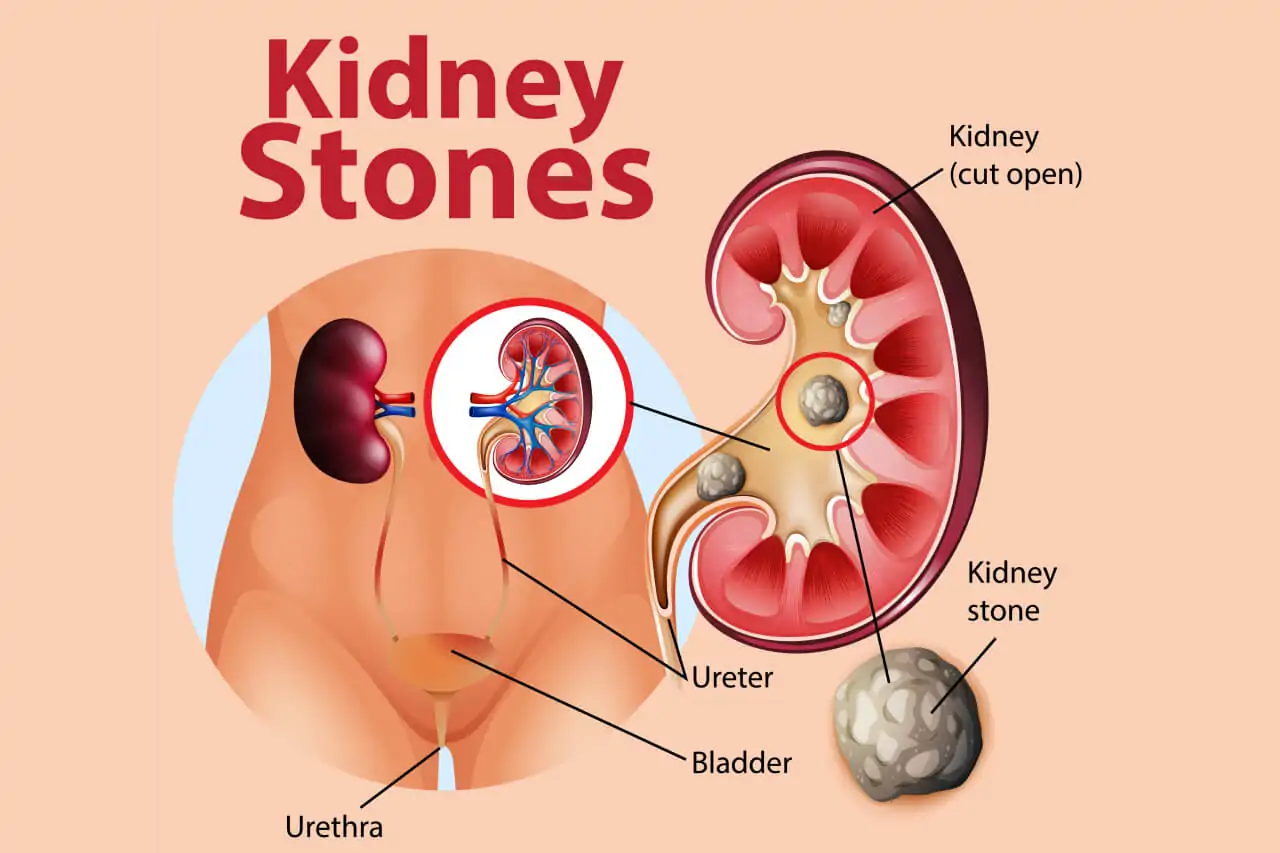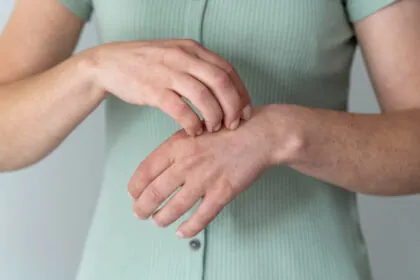Kidney stones, also known as renal calculi, are hard mineral and salt deposits that form in the kidneys.
They are made up of crystals that can clump together and become solid masses.
Kidney stones vary in size, ranging from tiny grains to larger stones that can be several centimeters in diameter.
Kidney stones can form when there is an imbalance in the urine composition, causing certain substances to crystallize and form stones.
Types of Stones
The most common types of kidney stones include:
Calcium stones
These are the most prevalent type of kidney stones and are typically made of calcium oxalate or calcium phosphate.
Excessive calcium or oxalate in the urine can lead to the formation of these stones.
Uric acid stones
Uric acid stones form when there is an elevated level of uric acid in the urine.
They can occur in individuals with conditions like gout or those who consume purine-rich foods.
Struvite stones
These stones often develop as a result of urinary tract infections. They are composed of magnesium, ammonium, and phosphate. Struvite stones can grow rapidly and become quite large.
Cystine stones
Cystine stones form in individuals with a rare inherited disorder called cystinuria.
The condition causes excessive amounts of the amino acid cystine to be excreted in urine, leading to stone formation.
Symptoms
The symptoms of kidney stones can vary depending on the size, location, and progression of the stone. Here are the common symptoms associated with kidney stones, along with a detailed explanation of each:
Severe pain
The most prominent symptom of kidney stones is severe pain, often referred to as renal colic.
This pain occurs when the stone obstructs the normal flow of urine, causing pressure to build up in the affected kidney.
The pain typically starts in the back or side below the ribs and may radiate to the lower abdomen or groin.
The intensity of the pain can fluctuate in waves as the stone moves within the urinary tract.
Hematuria
Blood in the urine, known as hematuria, is another common symptom.
It may be visible to the naked eye, giving the urine a pink, red, or brownish color.
Hematuria occurs when the stone damages the small blood vessels in the urinary tract or causes irritation and inflammation.
However, not all kidney stones lead to visible blood in the urine, and sometimes microscopic amounts of blood may only be detected through urine tests.
Frequent urination and urgency
Kidney stones can irritate the lining of the urinary tract, leading to increased frequency of urination (polyuria) and a sense of urgency to urinate.
Even small amounts of urine may trigger this sensation, as the stone can disrupt the normal signals that control bladder function.
Painful urination
As the kidney stone irritates the urinary tract, it can cause discomfort or a burning sensation during urination.
This symptom may resemble the sensation of a urinary tract infection (UTI), although it is important to note that kidney stones themselves are not an infection.
Cloudy or foul-smelling urine
Kidney stones can sometimes cause changes in the appearance or odor of urine.
The presence of minerals, especially if accompanied by an infection, can contribute to cloudy or smelly urine.
Back or abdominal pain
One of the most common symptoms of kidney stones is intense pain that originates in the back, below the ribs, and radiates to the lower abdomen and groin.
The pain can be constant or come in waves, and it may fluctuate in intensity depending on the movement of the stone within the urinary tract.
Nausea and vomiting
Many individuals with kidney stones experience nausea and may even vomit.
This can be a result of the severe pain, as well as the body’s response to the presence of the stone and the associated inflammation.
Restlessness and inability to find a comfortable position
The pain caused by kidney stones can make it difficult to find relief or a comfortable position.
People may feel restless and experience discomfort, leading to difficulty in sitting or lying down.
Strategies of Treatments
Here are some effective strategies for kidney stone treatment
Hydration and Fluid Intake
Adequate hydration is crucial to help prevent and treat kidney stones.
Drinking plenty of water and increasing fluid intake can help dilute urine and prevent the formation of crystals that lead to stone development.
Aim for at least 8-10 glasses of water per day, or more if advised by a healthcare professional.
Citrus juices like lemon or orange can also be beneficial as they contain citrate, a substance that can help inhibit stone formation.
Dietary Modifications
Adjusting your diet can play a significant role in kidney stone treatment. Some dietary strategies include:
- Limiting Sodium Intake: High sodium levels in the diet can increase calcium excretion in the urine, which may contribute to stone formation. Reduce the consumption of processed foods, canned goods, and fast food, as they tend to be high in sodium.
- Moderate Protein Consumption: A high intake of animal protein, such as meat and poultry, can elevate levels of uric acid and calcium in the urine, leading to stone formation. Moderating protein intake and opting for plant-based protein sources can be beneficial.
- Controlling Oxalate-Rich Foods: Some kidney stones are composed of calcium oxalate. Foods high in oxalate, such as spinach, rhubarb, beets, and certain nuts, should be consumed in moderation. This doesn’t mean eliminating them completely, but balancing their intake is recommended.
- Calcium Intake: Contrary to popular belief, adequate calcium intake is essential for preventing certain types of kidney stones. It binds with oxalate in the intestine, reducing the amount of oxalate that enters the urine. However, calcium supplements should be taken with caution, and it is advisable to consult with a healthcare professional.
Medications
There are several medications that can be prescribed to help treat kidney stones. These medications can serve different purposes in preventing or managing kidney stone formation. Here are some common medications used for treating kidney stones:
- Pain relievers: Nonsteroidal anti-inflammatory drugs (NSAIDs), such as ibuprofen and naproxen, are often used to manage the severe pain associated with kidney stones. They help to alleviate pain and reduce inflammation. Opioids may also be prescribed for more severe pain episodes.
- Alpha-blockers: Medications like tamsulosin, doxazosin, and terazosin are alpha-blockers that can help relax the muscles in the urinary tract, including the ureter. This relaxation can assist in passing the kidney stones, especially for smaller stones, by widening the ureter and improving stone movement.
- Calcium channel blockers: Medications like nifedipine, verapamil, or diltiazem, typically prescribed for blood pressure control, can also be used to relax the muscles in the ureter, assisting in stone passage.
- Diuretics: Diuretics like hydrochlorothiazide can increase urine production and fluid elimination, which may help prevent the formation of certain types of kidney stones. They are sometimes used in conjunction with dietary modifications to enhance stone prevention strategies.
- Allopurinol: Allopurinol is prescribed for patients with kidney stones caused by high levels of uric acid. It works by reducing the production of uric acid in the body, thereby preventing the formation of uric acid stones.
It’s important to note that medication choices and dosages can vary based on individual circumstances, stone composition, and other underlying medical conditions.
Kidney stones are a common condition that can cause significant discomfort and complications.
Understanding the causes, symptoms, and available treatment options is crucial in managing this condition effectively.
Incorporating certain lifestyle modifications, such as increasing fluid intake, adopting a balanced diet, and incorporating specific foods or supplements like fish oil that may help prevent and manage kidney stones can be beneficial.
Additionally, seeking medical advice and guidance from healthcare professionals is essential in developing a personalized treatment plan.
By taking proactive steps, individuals can minimize their risk of kidney stone formation and promote overall kidney health and well-being.
Remember, early detection, proper management, and regular medical check-ups are key to maintaining optimal kidney health.
FAQs
What are kidney stones?
Kidney stones are hard mineral and salt deposits that form in the kidneys.
What causes kidney stones?
Various factors contribute to kidney stone formation, including dehydration, certain medical conditions, family history, and dietary choices.
What are the symptoms of kidney stones?
Symptoms of kidney stones may include severe back or abdominal pain, blood in urine, frequent urination, and pain during urination.
How are kidney stones diagnosed?
Doctors can diagnose kidney stones through a combination of medical history, physical examination, imaging tests (such as CT scans or ultrasounds), and urine analysis.
What is the treatment for kidney stones?
Treatment options for kidney stones depend on the size, location, and severity of symptoms. They may include medications, lifestyle changes, increased fluid intake, or in some cases, procedures like lithotripsy or surgical removal.
Can kidney stones be prevented?
Yes, certain preventive measures can help reduce the risk of kidney stone formation, such as staying hydrated, following a balanced diet, limiting sodium intake, and avoiding excessive intake of oxalate-rich foods.





